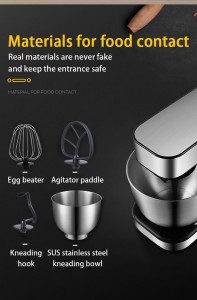can a stand mixer be used as a food processor
In today’s modern kitchen, efficiency and convenience are top priorities. Stand mixers and food processors are two of the most widely used kitchen appliances known for making cooking and baking a breeze. But have you ever wondered if you can get the most out of your stand mixer by using it as a food processor? In this blog post, we’ll explore the versatility of a stand mixer and find out whether it can be a worthy alternative to a food processor.
Learn about stand mixers:
A stand mixer is a powerful kitchen tool that has a variety of functions. It is primarily used for mixing, whipping and kneading ingredients in baking tasks. Its powerful motor and wide range of accessories, such as paddles, beaters and dough hooks, make it an indispensable appliance for making delicious cakes, biscuits and bread.
Food Processor: A Completely Different Beast:
Food processors, on the other hand, are designed to perform a variety of food preparation tasks such as chopping, slicing, shredding, and dicing. Its sharp blades and different attachments allow it to process soft and hard raw materials with precision. From preparing salads to making dough and even mincing meat, a food processor is a versatile device that saves time and energy in the kitchen.
Can a stand mixer be used as a food processor?
While a stand mixer may be an exceptional tool for baking and mixing tasks, it’s limited in its capabilities as a food processor. Although some stand mixers come with additional accessories, such as slicers and choppers, they may not provide the same level of precision and functionality as a dedicated food processor.
When simulating a food processor, one of the main limitations of a stand mixer is its shape. Stand mixers typically have a deep, narrow bowl, which can make it difficult to adequately chop or slice ingredients. Plus, its blades aren’t as sharp or as versatile as those in a food processor.
Also, the primary function of a stand mixer is to mix and aerate ingredients, with an emphasis on making smooth batters and doughs. While it can attempt some food processing tasks, it may not produce the desired consistency or texture. For example, a stand mixer may have trouble grating cheese or crushing nuts effectively.
The best of both worlds:
While a stand mixer may not completely replace a food processor, it can still be a useful assistant for certain food prep tasks. For example, a stand mixer’s paddle attachment can be used to quickly chop cooked chicken or mix ingredients for meatballs.
Another advantage of a stand mixer over a food processor is its ability to efficiently process large quantities of ingredients. So if you’re making a lot of salsa or dough, using a stand mixer may save you a lot of time and energy.
In conclusion, while a stand mixer is a valuable piece of equipment in any kitchen, it cannot completely replace a multipurpose food processor. Each appliance has its own unique features for different cooking and baking needs. So if you often find yourself performing a variety of food processing tasks, it might be worth investing in a dedicated food processor. However, don’t underestimate the power of a stand mixer. It remains an essential tool for mixing, whipping and kneading ingredients in baking and beyond.
